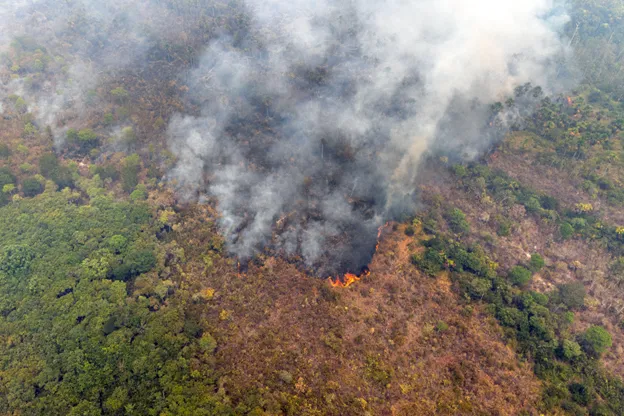At the beginning of September, fire threatened the school in Moxkarakô village, within the Kayapó Indigenous Land in the Pará Amazon. "The view was devastating because we couldn't see the other houses," says teacher Maria Nizan, who lives in São Félix do Xingu, Pará state, and spends seasons in the village teaching Indigenous children. She was there when the flames reached the houses. "I couldn't see the sky because of the smoke," she recalls.
The Kayapó Indigenous Land was the most scorched Indigenous territory in 2024, according to Mapbiomas Fire Monitor data. By September, 750,000 hectares had burned, covering around 18% of the territory. The Moikaraka village, home to about 250 people, suffered the most, with 169 fires.
In her four years working in the village, this was the most significant fire the teacher had ever seen. "The animals were fleeing, so desperate… And the fear was clear in their eyes," she says. She recalls seeing bush dogs, deer, pacas, and clouds of insects moving away from the fire. "It destroyed many trees, drove the animals away… And I'm sure the natural remedies the villagers used were lost too," she laments.
According to Jorge Eduardo Dantas, coordinator of Greenpeace Brazil's Indigenous Peoples Front, the flames that have spread across the territory originated in mining areas. "In our first survey about 20 days ago, it was clear that the burning areas were mining sites. Everything indicated that prospectors were opening new areas," Dantas explains. The survey was conducted in September.
In a statement, the Government Agency for Indigenous People (FUNAI, in Portuguese) reported that there were forest fires in the Indigenous Land in July, August, and September. "Most of these were related to mining," the statement said.
The Indigenous people of the territory live in villages along the tributaries of the Xingu River. Most of the territory lies in São Félix do Xingu, the municipality that burned the most in 2024, with more than 1 million hectares consumed by fire, and Ourilândia do Norte. In these two areas, mining is one of the main economic activities.
Both Ourilândia and São Félix do Xingu are towns closely linked to mining. "In this region, mining plays a significant economic and political role," explains Dantas.
Between September 6 and 14, the Brazilian Institute for the Environment and Renewable Resources (IBAMA, in Portuguese) conducted Operation Xapiri—Tuíre Kayapó to combat mining on Indigenous land. The inspection team dismantled 24 mining camps, and 11 offenders were identified and fined.
According to IBAMA, the territory has one of Brazil's highest mining alerts: more than 2,000 in less than a year.




